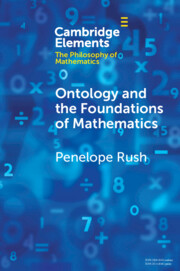Bibliography
Balaguer, M. (1998), Platonism and Anti-Platonism in Mathematics, Oxford University Press, Oxford.
Benacerraf, P. (1965), ‘What numbers could not be’, Philosophical Review, 74, 47–73.
Benacerraf, P. (1973), ‘Mathematical truth’, Journal of Philosophy, 70, 661–79.
Coffa, A. (1991), The Semantic Tradition from Kant to Carnap, Cambridge University Press, Cambridge.
Field, H. (2001), Truth and the Absence of Fact, Clarendon Press, Oxford.
Folina, J. (1994), ‘Poincare’s conception of the objectivity of mathematics’, Philosophia Mathematica, 2(3), 202–27.
Frege, G. (1970), ‘On sense and reference’, in Peter Geach (ed.) and Max Black (trans.), Translations from the Philosophical Writings of Gottlob Frege, Basil Blackwell, Oxford, pp. 56–78.
Frege, G. (1984), Collected Papers on Mathematics, Logic, and Philosophy, ed. McGuinness, Brian, trans. Max Black et al., Basil Blackwell, Oxford.
Gödel, K. (2001), Kurt Gödel: Collected Works Volume IV: Publications 1929–1936, ed. Solomon Feferman, John W. Dawson, Jr., Stephen C. Kleene, Gregory H. Moore, Robert M. Solovay, and Jean van Heijenoort, Oxford University Press, Oxford.
Hellman, G. and Shapiro, S. (2019), Mathematical Structuralism, Cambridge Elements, The Philosophy of Mathematics, Cambridge University Press, Cambridge.
Jenkins, C. S. (2005), ‘Realism and independence’, American Philosophical Quarterly, 42(3), 199–209.
MacBride, F. (2008), ‘Can ante rem structuralism solve the access problem?’, The Philosophical Quarterly, 58, 155–64.
Meillassoux, Q. (2008), ‘Time without becoming’ (transcript of talk, Middlesex University, London, 8 May).
Putnam, H. (1987), The Many Faces of Realism, Open Court, La Salle, IL.
Shapiro, S. (1997), Philosophy of Mathematics, Structure and Ontology, Oxford University Press, New York.
Shapiro, S. (2000a), ‘The status of logic’, in New Essays on the a Priori, Boghossian and Peacocke, Oxford University Press, New York, pp. 333–67.
Shapiro, S. (2000b), Thinking about Mathematics, The Philosophy of Mathematics, Oxford University Press, New York.
Shapiro, S. (2011), ‘Epistemology of mathematics: what are the questions? What counts as answers?’, The Philosophical Quarterly, 61(242), 130–50.
Wright, C. (1987), Realism, Meaning and Truth, Basil Blackwell, Oxford.
Wright, C. (1992), Truth and Objectivity, Harvard University Press, Cambridge, MA.
Wright, C. (2000), ‘Truth as a sort of epistemic, Putnam’s peregrinations’, The Journal of Philosophy, 97(6), 335–64.
Wright, C. (2004), ‘Warrant for nothing (and foundations for free)?’, Proceedings of the Aristotelian Society, supplementary volume, 78(1), 167–212.



